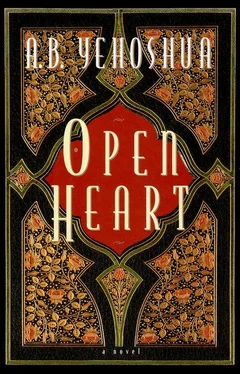In the meantime the first light of morning broke in the hazy sky, and a large round sun rose from an unexpected direction. Thus the day of the long journey to Varanasi began, in the glow of dirt roads, huts, and villages slipping slowly past the dark windows and the radiant, aromatic dimness of the big stations where we suddenly stopped among trains of various kinds and colors with droves of passengers getting in and out. During the few minutes of the stop, Lazar would sometimes hurry out to the stalls crowding the platform and bring us sweets or chapatis or bottles of unfamiliar effervescent drinks. His wife, if she didn’t join him, would stand at the window so as not to let him out of her sight. I had noticed their craving for sweet things in Rome, and even in India they hesitate suck and chew all kinds of candies whose names the Indian passenger taught them to pronounce. He himself had already changed his spotted old suit for a kind of white robe, which gave rise to a pleasant, intimate feeling, and indeed he was soon deep in conversation with Lazar’s wife, who seemed amused by his views on life and the world, but who was careful to question him in a tactful, friendly manner. This won him over to such an extent that he soon opened his little suitcase, took out an old deck of cards illustrated with all kinds of gaudy gods and demigods, and tried to teach us a kind of Indian poker, whose peculiar rules made her laugh so merrily that it seemed she had completely forgotten the purpose of our journey.
In the afternoon the Ganges appeared in all its vastness, flowing slowly not far from the train tracks, and the Indian’s dark face glowed in the abundant yellow light. Overcome with awe of the holiness flowing next to him, he stopped playing cards and chatting to Lazar’s wife, rose to his feet full of power and vitality, and retired to the corridor to sink into meditation opposite the holy river. But while the Indian was evidently growing stronger in anticipation of the baptism awaiting him, the sleepless Lazar was growing weaker; his eyes kept closing, his head nodded, fell, and jerked up again. “Try to lie down and rest for a while, don’t be so obstinate,” his wife urged him, but he was unable to let go of his tension: “It’s too late to sleep, we’ll be there soon.” Finally she succeeded in persuading him to take off his shoes and lie down on the seat, and even to overcome his embarrassment at my presence and lay his head on her round stomach, while she held his head firmly between her hands as if to absorb his anxiety into herself. And it worked, for after a few minutes of vacillating and grumbling, Lazar plunged into a deep sleep, his breathing very relaxed, as if he had fallen out under the hands of a practiced anesthetist. His wife tried to engage me in conversation, but I stopped her. “We shouldn’t disturb him,” I whispered, “now that he has finally fallen asleep.” My reaction surprised her, and for the first time I noticed an offended blush spreading over her cheeks, as the faint down covering them glinted in the sunlight. But she obediently took off her glasses and closed her eyes, and an hour later, when the train slowed down in preparation for its ceremonious entry into the last smoke-shrouded station and Lazar emerged from the abyss of his sleep, he discovered that his wife had fallen asleep with him.
The elderly Indian passenger, who had been so friendly and talkative during the long journey, had now become estranged and remote in anticipation of its ending. His relatives, dressed in white as he was, were already waiting for him on the crowded platform, and they immediately swallowed him up without a trace. The three of us were left staring, dumb and paralyzed. The crowds we had seen on the streets of New Delhi looked sparse and quiet compared to this one. We were obliged to stick close to each other and hang on tightly to our suitcases, which seemed to have taken on a life of their own as they jerked about in the frenzied crowd. We had to stop at Varanasi to make our connection to Gaya, but we had had no idea how many tourists and pilgrims would be engulfing this major attraction at the height of the tourist season. While Lazar was haggling with a lively, dwarfish porter who had attached himself to us, one of the Lazars’ two suitcases was carried away by the crowd. At first Lazar gave way to despair and seemed on the point of tears. But then he recovered and plunged into the crowd, pushing and shoving in search of the thief, refusing to resign himself to the loss even though his wife was already trying to comfort him. In the end they left me in a corner in charge of the cart piled with the rest of the luggage while they set out with the dwarf to search for the suitcase. Again I found it ridiculous that they had to do everything together.
But perhaps precisely because of this, they succeeded in accomplishing the impossible, fishing the suitcase out of the stormy sea of people into which it had been swept, not stolen, and loaded by mistake onto another porter’s cart. Now it reposed on the back of the diminutive porter, dusty and battered, as if in the short time of its disappearance it had traveled across an entire continent. And the same thing, it seemed to me, had happened to us. New Delhi had given us the illusion that we understood the rules of India, but in Varanasi we were all gripped by a feeling of anxiety, and Lazar, whose deep sleep on the stomach of his wife had restored his alertness and vigor, instructed me in no uncertain terms to stick closely to him and not to start dreaming now; for indeed, with astonishing perceptiveness, he had caught me in the kind of dreaminess that sometimes took hold of me in the hospital at dawn, after a night on call, when I crossed the borderline into a new working day. “But what makes you think that he wants to dream now?” said his wife in surprise. “The dream is what’s happening here around us.” But Lazar didn’t answer her, because at that moment it seemed to him that one of the suitcases was about to fall off the cart racing ahead of us, and he rushed forward to catch it, only to trip and fall onto the platform himself. He sprang up immediately, an expression of wounded pride on his face, and also of offense, as his wife exploded into merry peals of laughter, which continued as she asked him if he had hurt himself while helping him dust off his clothes. “It’s not a dream, it’s madness,” he said, smiling at himself. “What’s going on here is total madness. Let’s get out of this station at least.” But the madness was waiting for us outside the station too, in the seething streets of the dusty, humid city, where the air was full of sweetish, colorful, unfamiliar stench. Without waiting for instructions, the porter hurried ahead, accompanied now by a flock of barefoot children, who stretched out filthy little hands to finger the smooth leather of the suitcases. “But where is he rushing to, that crazy little dwarf?” asked Lazar in astonishment. “To the hotel,” replied his wife. “The hotel?” echoed the bewildered Lazar. “What hotel?”
“He told me about a nice hotel overlooking the river, with a view of the bathing ghats the man in the train told us about.”
“But what hotel, Dori?” repeated Lazar in alarm, unable to believe that his wife had already come to an agreement with the little porter. “A hotel in the old city,” she replied, “next to the river.”
“Have you lost your mind, to follow a character like that to some hotel in the old city in the middle of all the muck? What’s come over you? I don’t understand.”
But his wife was unperturbed by this outburst. “What harm can it do to try? We’ve got plenty of time. The Indian in the train said it’s the only place to find a hotel, and since we’re stuck here, at least we’ll be able to watch their ceremonies from the window.”
Читать дальше












